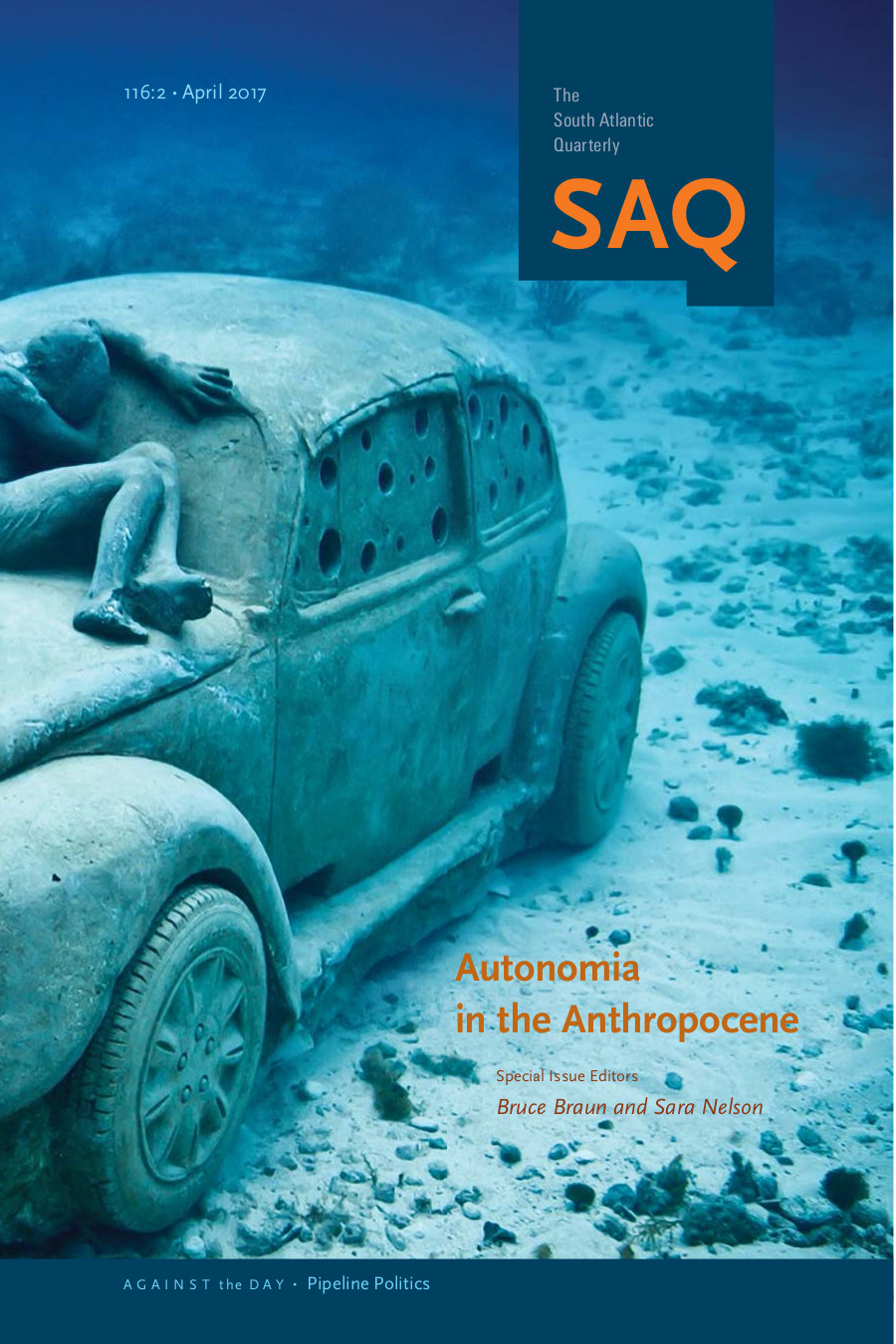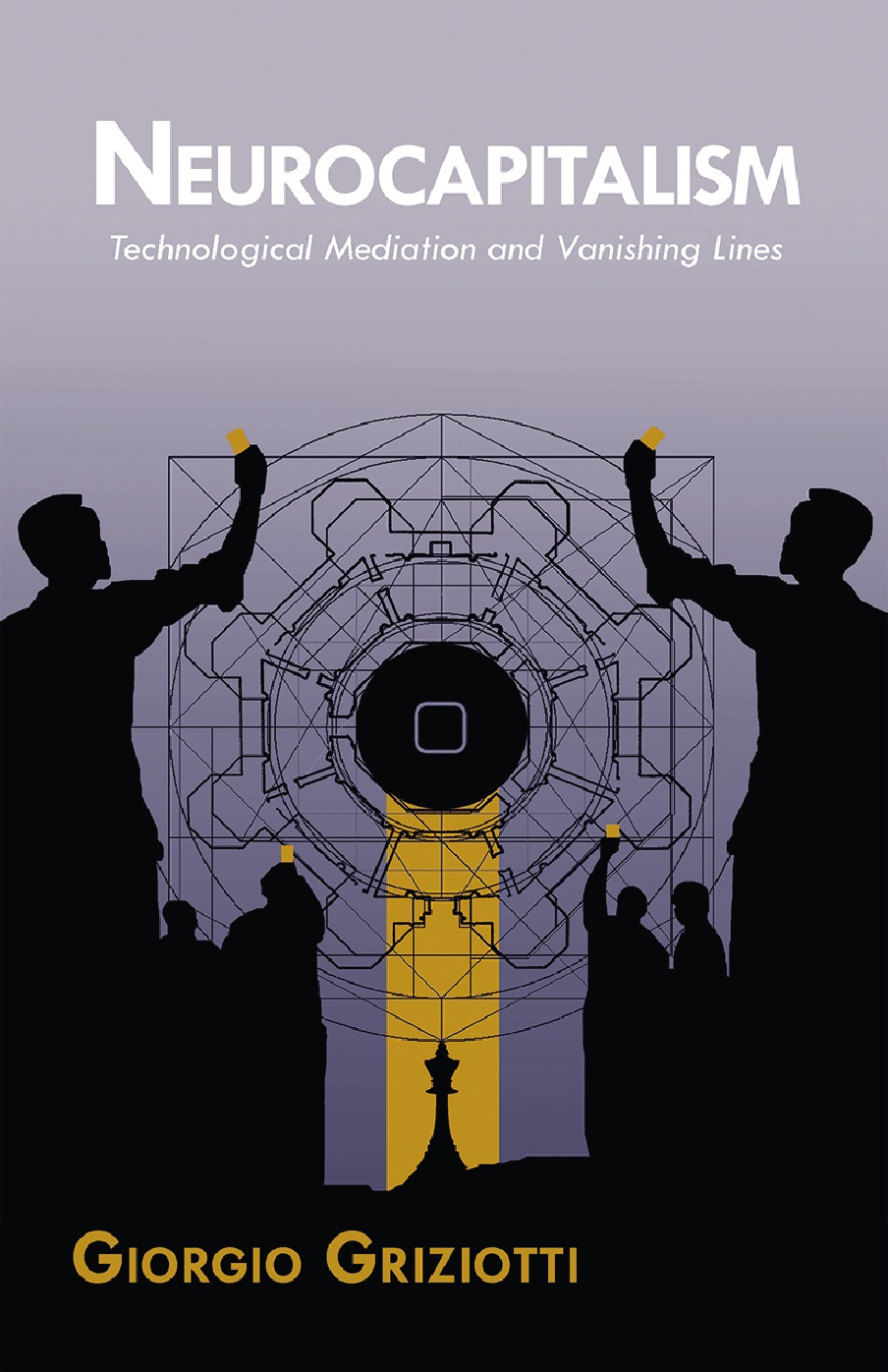South Atlantic Quarterly, 116(2): Autonomia in the Anthropocene (2017)
Filed under journal | Tags: · anthropocene, autonomy, capitalism, cognitive capitalism, commons, labour, marxism, multitude, subjectivity

“Despite Autonomia’s widespread influence on political action and post-Marxist scholarship, it has been surprisingly slow to address planetary change and environmental politics. With a focus on cognitive capitalism, many autonomist scholars have downplayed or fully ignored the ecological dimensions of post-Fordism—its foundations in extractive energy economies, its links to the accelerating financialization of nature under the banner of so-called green capitalism, its harnessing of nonhuman capacities, and its wildly uneven toxic geographies. This lack of engagement is regrettable given that, we propose, autonomist insights hold great promise for understanding both the transformed relation between capital and nonhuman natures in post-Fordism and the many political movements that have emerged in response. […]
It is no longer evident that key terms found in the autonomist lexicon—species being, the common, multitude, potentia—survive the challenge of the Anthropocene unchanged or that the production of subjectivity (a cornerstone of autonomist thought) can be understood solely in terms of language, habit, or gesture. It may therefore be necessary to think beyond the struggles of the factory floor, or those of the cognitariat today, to imagine and think from other sites of struggle, other forms of solidarity, and other experiments in “commoning.” These bring into play unfamiliar actors and unacknowledged geographies: sites of extraction and circuits of waste, indigenous communities and territories, rising seas and toxic landscapes that are materially present within the informationalized economies of global capitalism, but often invisible to those working within them. We might say, then, that the Anthropocene names autonomist Marxism’s unthought, an unthought that intrudes on its political imaginaries. What happens to autonomism if it begins to question the autonomy of the human? Or if it leaves its privileged sites in the global North?”
With contributions by Sara Nelson and Bruce Braun, Miriam Tola, Jason Read, Elizabeth R. Johnson, Elizabeth A. Povinelli, Matteo Pasquinelli, Karen Pinkus, Marco Armiero and Massimo De Angelis, Anja Kanngieser and Nicholas Beuret, and Isabelle Stengers.
Edited by Sara Nelson and Bruce Braun
Publisher Duke University Press, Apr 2017
ISSN 0038-2876
178 pages
Giorgio Griziotti: Neurocapitalism: Technological Mediation and Vanishing Lines (2016–)
Filed under book | Tags: · automation, capitalism, commons, decentralization, labour, neurocapitalism, politics, production, technology, theory

“Analyzes the changing politics of technology, charting out possibilities for autonomous cooperation
Technological change is ridden with conflicts, bifurcations and unexpected developments. Neurocapitalism takes us on an extraordinarily original journey through the effects that cutting-edge technology has on cultural, anthropological, socio-economic and political dynamics. Today, neurocapitalism shapes the technological production of the commons, transforming them into tools for commercialization, automatic control, and crisis management.
But all is not lost: in highlighting the growing role of General Intellect’s autonomous and cooperative production through the development of the commons and alternative and antagonistic uses of new technologies, Giorgio Griziotti proposes new ideas for the organization of the multitudes of the new millennium.”
First published as Neurocapitalismo: Mediazioni tecnologiche e linee di fuga, Mimesis, 2016.
Foreword by Tiziana Terranova
Translated by Jason Francis McGimsey
Publisher Minor Compositions, Colchester, February 2019
Open access
ISBN 1570273421, 9781570273421
244 pages
PDF, PDF
Reviews and extracts in Italian, Spanish and French
Felix Stalder: The Digital Condition (2016–)
Filed under book | Tags: · algorithm, commons, culture, democracy, digital condition, digital culture, networks, politics, post-democracy, social media, technology, web

“Our daily lives, our culture and our politics are now shaped by the digital condition as large numbers of people involve themselves in contentious negotiations of meaning in ever more dimensions of life, from the trivial to the profound. They are making use of the capacities of complex communication infrastructures, currently dominated by social mass media such as Twitter and Facebook, on which they have come to depend.
Amidst a confusing plurality, Felix Stalder argues that are three key constituents of this condition: the use of existing cultural materials for one’s own production, the way in which new meaning is established as a collective endeavour, and the underlying role of algorithms and automated decision-making processes that reduce and give shape to massive volumes of data. These three characteristics define what Stalder calls ‘the digital condition’. Stalder also examines the profound political implications of this new culture. We stand at a crossroads between post-democracy and the commons, a concentration of power among the few or a genuine widening of participation, with the digital condition offering the potential for starkly different outcomes.
This ambitious and wide-ranging theory of our contemporary digital condition will be of great interest to students and scholars in media and communications, cultural studies, and social, political and cultural theory, as well as to a wider readership interested in the ways in which culture and politics are changing today.”
First published in German as Kultur der Digitalität, Suhrkamp Verlag, Berlin, 2016.
Translated by Valentine Pakis
Publisher Polity Press, Cambridge, UK, 2018
ISBN 9781509519590, 1509519599
xi+204 pages
Reviews (in German)
Comment (0)
